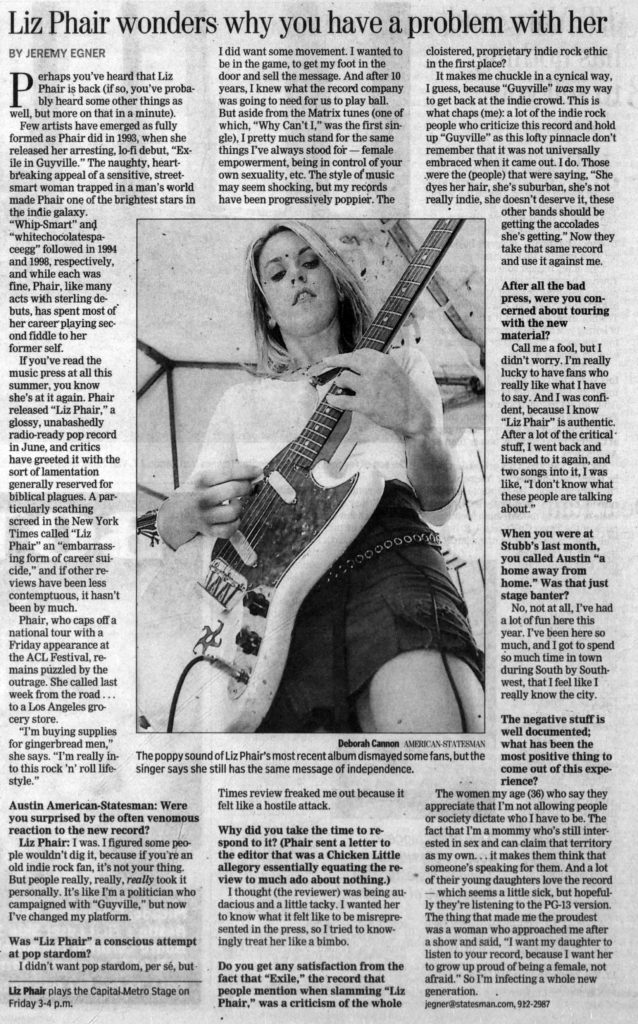By Jeremy Enger
The Austin American-Statesman, September 18, 2003
Perhaps you’ve heard that Liz Phair is back (if so, you’ve probably heard some other things as well, but more on that in a minute).
Few artists have emerged as fully formed as Phair did in 1993, when she released her arresting, lo-fi debut, Exile in Guyville. The naughty, heartbreaking appeal of a sensitive, street-smart woman trapped in a man’s world made Phair one of the brightest stars in the indie galaxy. Whip-Smart and whitechocolatespaceegg followed in 1994 and 1998, respectively, and while each was fine, Phair, like many acts with sterling debuts, has spent most of her career playing second fiddle to her former self.
If you’ve read the music press at all this summer, you know she’s at it again. Phair released Liz Phair, a glossy, unabashedly radio-ready pop record in June, and critics have greeted it with the sort of lamentation generally reserved for biblical plagues. A particularly scathing screed in The New York Times called Liz Phair an “embarrassing form of career suicide,” and if other reviews have been less contemptous, it hasn’t been by much.
Phair, who caps off a national tour with a Friday appearance at the ACL Festival, remains puzzled by the outrage. She called last week from the road… to a Los Angeles grocery store.
“I’m buying supplies for gingerbread men,” she says. “I’m really into this rock ‘n’ roll lifestyle.”
Austin American-Statesman: Were you surprised by the often venomous reaction to the new record?
Liz Phair: I was. I figured some people wouldn’t dig it, because if you’re an old indie rock fan, it’s not your thing. But people really, really, really took it personally. It’s like I’m a politician who campaigned with Guyville, but now I’ve changed my platform.
Was Liz Phair a conscious attempt at pop stardom?
I didn’t want pop stardom, per se, but I did want some movement. I wanted to be in the game, to get my foot in the door and sell the message. And after 10 years, I knew what the record company was going to need for us to play ball. But aside from the Matrix tunes (one of which, “Why Can’t I”, was the first single), I pretty much stand for the same things I’ve always stood for — female empowerment, being in control of your own sexuality, etc. The style of music may seem shocking, but my records have been progressively poppier. The Times review freaked me out because it felt like a hostile attack.
Why did you take the time to respond to it? (Phair sent a letter to the editor that was a Chicken Little allegory essentially equating the reviewer to much ado about nothing.)
I thought (the reviewer) was being audacious and a little tacky. I wanted her to know what it felt like to be misrepresented in the press, so I tried to knowingly treat her like a bimbo.
Do you get any satisfaction that Exile, the record that people mention when slamming Liz Phair, was a criticism of the whole, cloistered, proprietary indie rock ethic in the first place?
It makes me chuckle in a cynical way, I guess, because Guyville was my way to get back at the indie crowd. This is what chaps (me): a lot of the indie rock people who criticize this record and hold Guyville as this lofty pinnacle don’t remember that it was not universally embraced when it came out. I do. Those were the (people) that were saying, “She dyes her hair, she’s suburban, she’s not really indie, she doesn’t deserve it, these other bands should be getting the accolades she’s getting.” Now they take that same record and use it against me.
After all the bad press, were you concerned about touring with the new material?
Call me a fool, but I didn’t worry. I’m really lucky to have fans who really like what I have to say. And I was confident, because I know Liz Phair is authentic. After a lot of the critical stuff, I went back and listened to it again, and two songs into it, I was like, “I don’t know what these people are talking about.”
When you were at Stubb’s last month, you called Austin “a home away from home.” Was that just stage banter?
No, not at all, I’ve had a lot of fun here this year. I’ve been here so much, and I got to spend so much time in town during South By Southwest, that I feel like I really know the city.
The negative stuff is well documented; what has been the most positive thing to come out of this experience?
The women my age (36) who say they appreciate that I’m not allowing people or society dictate who I have to be. The fact that I’m a mommy who’s still interested in sex and can claim that territory as my own… it makes them think that someone’s speaking for them. And a lot of their young daughters love the record — which seems a little sick, but hopefully they’re listening to the PG-13 version. The thing that made me the proudest was a woman who approached me after a show and said, “I want my daughter to listen to your record, because I want her to grow up proud of being a female, not afraid.” So I’m infecting a whole new generation.







